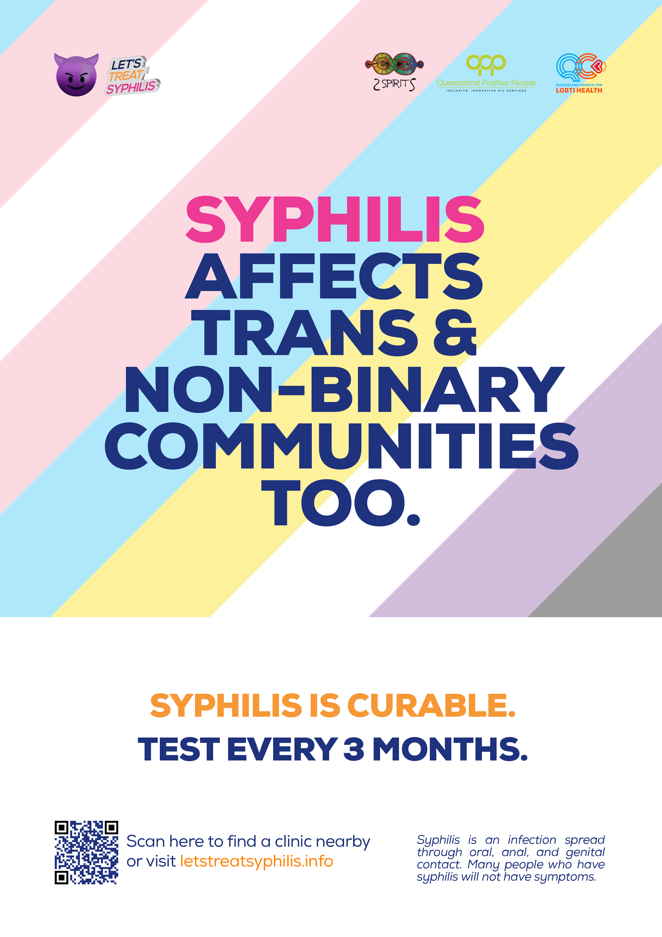
Syphilis
Syphilis is a curable STI, it is caused by the Treponema Pallidum Bacteria, and it can be present with or without signs and symptoms. Not everyone who has Syphilis will have signs of infection, so a person can have it and pass it on without even knowing.
All stages are infectious and can be passed on to sexual partners for up to 2 years if the person is not treated.
Not everyone who has Syphilis have signs of infection, so a person can have it and pass it on to others without knowing.
Primary Syphilis
Syphilis can initially cause sores or ulcers around the genital area, mouth, or throat 10 - 90 days after infection. These sores, called chancres can be any size or shape. They are often painless, don’t bleed and can feel like a hard button on the skin. Sometimes these sores may be internal and go unnoticed. This is called the primary stage of Syphilis.
** If not treated, the sores usually heal and disappear after a few weeks, however the Syphilis infection remains in the body and the person still has the infection. **
Secondary Syphilis
Two to six months after getting infected, the secondary stage of Syphilis occurs. Symptoms may include a flu-like illness, rash on the trunk, palms and soles of the feet, swollen glands, wart like lumps around the moist areas of the body and hair loss. Some people also get headaches, tiredness and pains in the bones, muscles, and joints. Even after these symptoms have gone, the person is still infectious.
Early Latent Syphilis
This means that the person does not have any signs or symptoms but is infectious. The only way they would know they have Syphilis is to have a blood test.
Late Latent Syphilis
This means the person is not infectious. The only way the person would know they have Syphilis would be to get a blood test.
If the infection is not treated, the signs and symptoms will go away, although some of them may come and go for up to a year. However, the Syphilis infection remains in the body and people can pass Syphilis onto their sexual partners during this time for up to 2 years.
** If late latent Syphilis is not treated over time (which may be many years), the Syphilis infection can affect different parts of the body. It can cause problems with nerves, the brain, and the large vessels near the heart. **
Syphilis is spread by unprotected genital (Vaginal and anal) contact and oral sex. A person can also be infected through intimate skin to skin contact with an infected person through sex.
** Syphilis can also increase the risk of HIV transmission. **
In Australia, the groups at particular risk include:
• Transgender, Gender Diverse and Non-Binary people.
• Gay, Bisexual men and other men who have sex with men. Female sexual partners of men who have sex with men.
• First Nations people.
• People who have unprotected sex with people who have Syphilis.
• People who have unprotected sex in countries with high rates of Syphilis.
• Babies of parents who have not had adequate ante-natal care, including Syphilis testing during pregnancy.
For more information visit

The safest ways to protect against Syphilis are to:
• Always use condoms or dental dams and water-based lubricant (Condoms and dams are the best way of protecting against Syphilis and other STIs).
• Avoid having sex with someone who has a visible ulcer or sore on their genitals and/or mouth.
• Have regular STI check-ups. Especially if your partner/s change.
• If diagnosed with an STI, complete the recommended course of treatment.
Anyone who is pregnant should have a Syphilis test within the first 12 weeks of pregnancy or at the first antenatal visit. The earlier Syphilis is treated during pregnancy, the lower the risk of the baby being affected by Syphilis.
There is no vaccine for Syphilis. Previous infection and previous treatment do not protect a person from getting Syphilis again.
A simple blood test is usually used to diagnose Syphilis. If a person has an ulcer or sore this can also be tested with a swab.
There is a short period after exposure to Syphilis when the tests may not pick up the early stages of infection and repeat tests may be necessary. If a person has contracted Syphilis, they will test positive by blood tests three months after infection and usually much earlier.
** Sometimes people with Syphilis have other STIs, so tests for other STIs should be completed at the same time **
Syphilis is usually managed with penicillin injections which treat the infection in five days. A person with Syphilis should abstain from sexual activity until 5 days after completing their course of treatment and all signs and symptoms of Syphilis have cleared.
** It is important to have regular blood tests three to six months after Syphilis treatment to check that the treatment has worked. **
Even after treatment, some of the blood tests will remain positive for Syphilis. This does not mean that the person is still infected, it just shows they have had Syphilis in the past. It is important that all sexual partners get treated to stop re-infection and to prevent the infection spreading in the community.
** A person with Syphilis can help by advising sexual partners to get tested and treated for Syphilis. **
+
-
+
-
+
-
+
-
+
-
+
-


